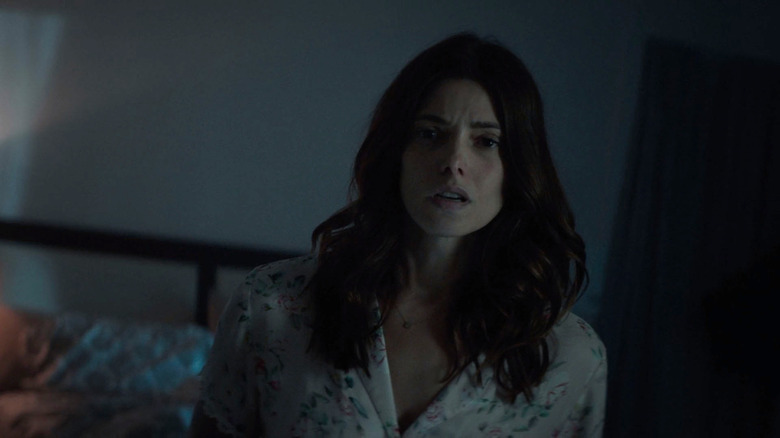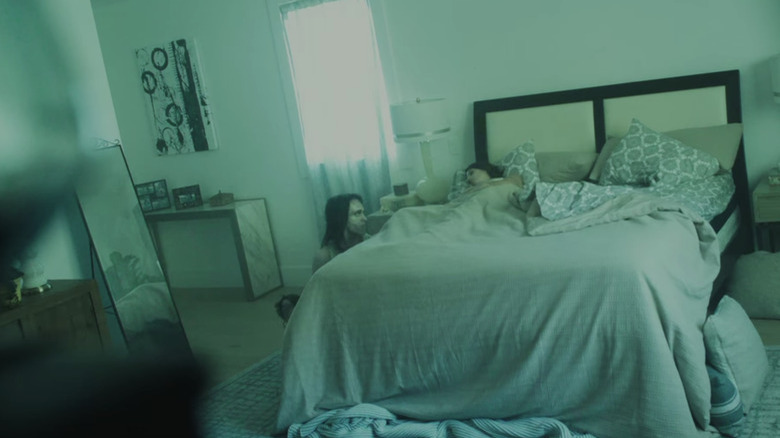The Horror Movie Aftermath Is Blowing Up On Netflix, But Is It As Scary As People Say?
Peter Winther's "Aftermath" continues the ongoing tradition of horror movies centering on particular sections of the real estate market being made available for a bargain due to the unspeakable tragedies that occurred there. It's a form of property hunting that (for better or for worse) doesn't really exist in the real world, yet it's provided the setup for a multitude of homebound shockers. Couples never seem to realize that if the deal is too good to be true, it probably, most definitely is. This time around, it's actually the husband who does the convincing, instead of a conniving real estate agent who doesn't reveal the property's dark past.
Kevin Dadich (Shawn Ashmore) is a crime scene cleaner who discovers his dream house when he's sweeping up brain matter after an apparent murder-suicide. Looking for a fresh start after his wife Natalie (Ashley Greene) had an affair, the couple is already on shaky ground when they agree to buy the house from Claudia (Paula Garcés), whose late brother Jay and his wife Erin died there.
Wouldn't you know it, just after moving day, strange occurrences start happening with increasing frequency. Unexplained love notes and text messages start to pop up that Kevin denies ever writing or sending, and Natalie becomes convinced that she's seeing a mysterious slender man stalking her when she's alone in the house. What appears to be some sort of residual paranormal activity at first becomes more of a complex web of mystery once the pieces start to fall into place.
"Aftermath" is currently trending on Netflix, and seems to be terrifying the majority of the couples that watch it. But, really, how scary is it?
A Surburban haunting with a twist
Although there are a few genuine jump scares, stingers, and creepy reveals, structurally, Peter Winther's "Aftermath" has a lot more in common with labyrinthine thrillers like the New Zealand horror comedy "Housebound" and last year's AirBnB breakout hit "Barbarian." As Natalie continues to experience unexplainable occurrences in the house, the outside world also starts to creep in. Flowers are anonymously delivered to the front door, packages of pornography are sent to discredit and embarrass Kevin, and a wild teenager breaks in and attacks Natalie based on unconfirmed rumors swirling around that she's wildly promiscuous.
From there, "Aftermath" becomes much more conspiratorial as it starts to become clear that someone or something (or perhaps both) want the couple to pack their things and never look back. In a setup reminiscent of "Paranormal Activity," Winther's film makes it clear that a frightening haunting can happen inside the new construction of an idyllic dream home just as easily as it can inside an ominous, century-old mansion. In a last ditch effort to capture the mysterious man she keeps seeing on tape, Natalie sets up cameras all over the house, which kicks off a series of reveals that make "Aftermath" go from a fairly paint-by-numbers thriller to a reasonably satisfying mystery.
Ultimately, the movie's ending would be considered a tad far-fetched if it wasn't for the fact that its story was inspired by real events. Mind you, however, the third act takes those kernels of truth and goes in an entirely different direction.
Based on a true story ... sort of
Most likely, the reason why "Aftermath" has been so unsettling to viewers is because it successfully captures the feeling of being watched. There's a subtle manipulation happening too, which Peter Winther manages to sell quite well.
If Ryan Murphy's Netflix series "The Watcher" is coming to mind, that's not a coincidence. The threatening notes that a well-to-do couple receive over the course of Murphy's show are based on a true story, and the events of "Aftermath" also have a real history behind them. As revealed in an exposé by People, a San Diego couple living in the high-end neighborhood of Carmel Valley was tormented by a woman named Kathy Rowe — a rival buyer who lost out on her bid for the Spanish-style house the couple wound up purchasing. The harassment lasted for months before Rowe was finally discovered and charged with felony stalking.
"Aftermath" takes that premise and eventually pays it off with a truly bizarre conclusion that should make the two hour commitment worth it to most couples looking for a mildly frightening suburban mystery. The film is certainly perfect fodder for the Netflix algorithm. With more effective reveals done in far superior films as of late, the pretzel-shaped twists displayed in Winther's surface level ghost story may seem a little predictable. Still, only sharp-eyed true crime aficionados will guess the absolutely outlandish ending. That's either an indication of how clever it is, or a sign that it's more than just borderline ridiculous.


